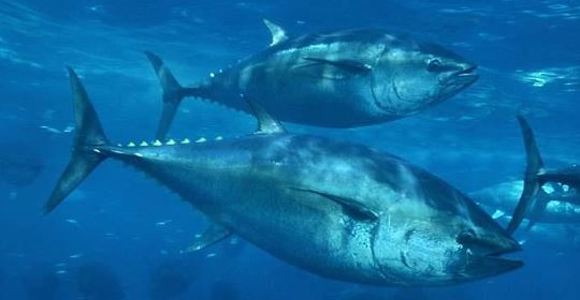A Pacific-wide three-month ban on fish aggregating devices (FADs) has been extended for another year to allow tuna stocks to continue to revive. In a warning to other fishing nations, Palau is going ahead with its ban on all commercial fishing vessels.

Bigeye tuna Credit: PNA
Chief Executive of the Parties to Nauru Agreement, Ludwig Kumoru, says levels of bigeye tuna stocks in the Pacific are improving, but not enough to lift an annual three-month ban on fish aggregating devices (FADs).
FADs allow the fishing industry to know what is swimming beneath the sea miles away from fishing vessels.
The annual ban was put in place 11 years ago, after the Western and Central Pacific Fisheries Commission estimated that tuna stocks had fallen to about 32 per cent of their pre-industrialised fishing levels.
‘Bigeye tuna has been a major concern for the tuna fishery over the last 10 to 15 years’
Skipjack is the most abundant tuna in the western Pacific, accounting for 70-75 per cent of the catch in the region—followed by yellowfin, bigeye and albacore.
Bigeye stocks in particular became depleted after purse seiner vessels started picking up juveniles using FADs.
Tuna

The PNA’s Ludwig Kumoro Credit: PNA
The annual Commission meeting last December confirmed the ban will continue until at least 2021.
Of the six distant fishing ‘nations’—Japan, the US, Taiwan, China, South Korea and the European Union—only Japan was supportive of continuing the ban.
‘Bigeye tuna has been a major concern for the tuna fishery over the last 10 to 15 years because the stocks declined to a level where we were forced to declare the stock was overfished,’ Ludwig Kumoru tells Business Advantage PNG.
He estimates between 50,000 and 80,000 FADs are deployed in PNA waters annually.
The FADs now have sonar and satellite buoys attached, and allow fishing companies to estimate where most tuna congregate based on data from the sonar equipment.
‘The PNA will not see any conservation measures for bigeye tuna relaxed including the seasonal ban on FADs’
‘So, it’s gone from a fishing operation, which is hunting, to a farming operation, where it is like cherry-picking,’ says Maurice Brownjohn, commercial manager at PNA.
Healthy levels
The ban is working, says Kumoru, because bigeye tuna stocks are now at a healthy level.
‘Though this advice is a relief for the Pacific tuna nations, it is too early to rely on this recent advice and hence, the PNA will not see any conservation measures for bigeye tuna relaxed, including the seasonal ban on FADs.’
‘Palau has banned all commercial fishing vessels from its tropical waters’
The FAD ban applies to purse seiners in the Pacific countries’ exclusive economic zones and high seas areas from 1 July to 30 September, and an additional two-month prohibition on FAD use on the high seas.
Palau ban
In a warning to the international fishing industry to take the sustainability concerns of Pacific nations more seriously, Palau has banned all commercial fishing vessels from its tropical waters.
The aim is to create a marine reserve measuring more than 500,000 square kms of ocean, an area slightly smaller than France.
The ban comes into force once current fishing contracts with Japan, Taiwan, and some private companies, expire.








Speak Your Mind